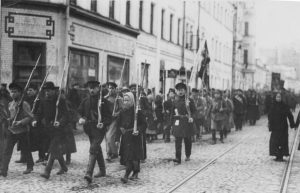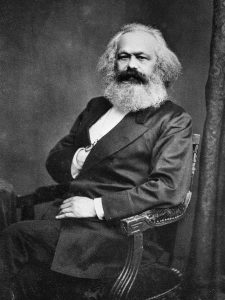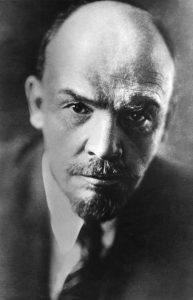5.2.3 Communism
Dr. Étienne Schmitt

The third division separates the “revolutionary” currents, for which the break with capitalism necessarily involves revolution, from the “reformist” currents, which aspire to transform social and political institutions by peacefully gaining power. This division was shaped in the 19th century and took on considerable importance with the Russian Revolution of 1917 and the creation of the Communist International (Third International) in 1919. The Third International’s membership provoked a definitive split between revolutionary and reformist currents within the labour movement.
Socialism or communism?
What is communism and how does it differ from socialism? Before the creation of the Third International in 1919, there was no clear distinction between socialism and communism. Certainly, on a conceptual level, Karl Marx and Friedrich Engels explain that socialism corresponds to a historical phase in which a permanent revolution will lead to the advent of communism; they describe this as an ideal society, liberated from capitalism, without class or state. In fact, Karl Marx and Friedrich Engels rarely use the term “communism” in their writings, especially after the League of Communists, – which they joined in 1847 and for which they wrote the political program: The Manifesto of the Communist Party ([1848] 1969), – was dissolved in 1852. Moreover, Karl Marx and Friedrich Engels – as well as their direct successors commonly called “Marxists” – did not define themselves as Communists. It is therefore difficult to speak of communism before 1919 and preferable to speak of socialism.
Before Communism: Marxism

So then, what is Marxism? Karl Marx himself defines his ideology as “scientific socialism” that is socialism based on a scientific analysis of human societies. From this analysis, Karl Marx proposes a materialist conception of history, perceiving it as the perpetuation of the class struggle. He explains that the changes in modes of production: slavery, feudalism, then capitalism, create struggles between a dominant class and dominated classes. In the era of capitalism, domination is achieved through labour. For Marx, the value of a good is determined by the material cost of production and the labour necessary to produce it. However, the bourgeoisie that owns the means of production – that is, the capital – determines the value of a good not according to the value of production, but according to the value of exchange. And this exchange value includes the remuneration of capital. To remunerate itself, capital attributes to itself surplus value or the difference between the value added by the worker to the good and the value of the labour-power necessary for its production. The holding of capital is therefore the spoliation of the labour of others.
For Karl Marx, the constant search for profit leads to the accumulation of capital, which causes the impoverishment of the proletariat. Becoming aware of itself as a social class, the proletariat turns against the bourgeoisie. This is class struggle. The proletariat, however, is not only exploited: it is alienated by the bourgeoisie. The state, the nation, religion and collective values are shaped to establish the domination of capitalism and to comfort the bourgeoisie in its privileges. This is why Karl Marx and his followers advocate for a revolution to overthrow the existing system and build a truly socialist society in which the means of production are collectivized. Before that, the proletariat must come to power. The dictatorship of the proletariat, conceived by Karl Marx as a transitional step toward socialism/communism, is organized on the model of a revolutionary democracy in which every proletarian has a voice. In this way, it would restore equality and deconstruct capitalism.
The Bolshevik Revolution and its consequences

Communism was clearly different from socialism under the influence of Vladimir Ilyich Ulyanov (known as Lenin). Lenin develops the concept of the dictatorship of the proletariat theorized by Karl Marx in order to propose a proletarian state that would help establish a communist society. Lenin suggests that this state can be called communist “as the means of production becomes common property, the word ‘communism’ is also applicable here” (Lenin, [1917] 1999), adding that it is certainly not integral communism. Thus, in Lenin’s vision, a political regime can be qualified as “communist”, though only imperfectly so.
Serving to justify the Russian Revolution of 1917 and the creation of the Soviets, Lenin’s interpretation of Marxism earned him several criticisms, including those of Rosa Luxembourg and Karl Kautsky, heirs of Karl Marx’s philosophy. In addition to justifying the possibility of a communist regime, Lenin believes that the proletarian revolution must be organized on a vanguard, a party of professional revolutionaries, that pursues the objective of taking power. Communism is no longer just a regime; it is a party. This idea, which is set out in his pamphlet What is to be Done? ([1902] 1961), is, once again, at odds with orthodox Marxism, which argues that revolution must emanate from the social movement.
Lenin succeeded in imposing the idea that the Bolshevik Revolution was the beginning of a world proletarian revolution. According to him, the Bolshevik Revolution was the concrete perspective of communism. Other revolutions, such as in China (1949), Cuba (1961), Vietnam (1954) and Yugoslavia (1945), led to the creation of singular communisms. In spite of their differences, all were inspired by Marxism-Leninism; that is, they were founded by a revolutionary party centered on a vanguard, the internationalism of the workers’ movement, the dictatorship of the proletariat as the basis for the self-emancipation of the working class and collectivism as the pooling of the means of production.

